
Alexander I Theopator Euergetes, surnamed Balas, was the ruler of the Seleucid Empire from 150 BC to August 145 BC. Picked from obscurity and supported by the neighboring Roman-allied Kingdom of Pergamon, Alexander landed in Phoenicia in 152 BC and started a civil war against Seleucid King Demetrius I Soter. Backed by mercenaries and factions of the Seleucid Empire unhappy with the existing government, he defeated Demetrius and took the crown in 150 BC. He married the princess Cleopatra Thea to seal an alliance with the neighboring Ptolemaic kingdom. His reign saw the steady retreat of the Seleucid Empire's eastern border, with important eastern satrapies such as Media being lost to the nascent Parthian Empire. In 147 BC, Demetrius II Nicator, the young son of Demetrius I, began a campaign to overthrow Balas, and civil war resumed. Alexander's ally, Ptolemaic king Ptolemy VI Philometor, moved troops into Coele-Syria to support Alexander, but then switched sides and threw his support behind Demetrius II. At the Battle of the Oenoparus River in Syria, he was defeated by Ptolemy VI and he died shortly afterward.

The Seleucid Empire was a Greek power in West Asia during the Hellenistic period. It was founded in 312 BC by the Macedonian general Seleucus I Nicator, following the division of the Macedonian Empire founded by Alexander the Great, and ruled by the Seleucid dynasty until its annexation by the Roman Republic under Pompey in 63 BC.
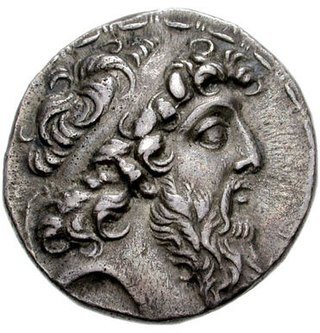
Demetrius II, called Nicator, was one of the sons of Demetrius I Soter. His mother may have been Laodice V, as was the case with his brother Antiochus VII Sidetes. Demetrius ruled the Seleucid Empire for two periods, separated by a number of years of captivity in Hyrcania in Parthia, first from September 145 BC to July/August 138 BC, and again from 129 BC until his death in 125 BC. His brother Antiochus VII ruled the Seleucid Empire in the interim between his two reigns.
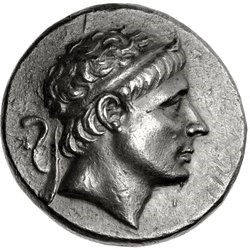
Antiochus II Theos was a Greek king of the Hellenistic Seleucid Empire who reigned from 261 to 246 BC. He succeeded his father Antiochus I Soter in the winter of 262–61 BC. He was the younger son of Antiochus I and princess Stratonice, the daughter of Demetrius Poliorcetes.

Ptolemy VI Philometor was a Greek king of Ptolemaic Egypt who reigned from 180 to 164 BC and from 163 to 145 BC. He is often considered the last ruler of ancient Egypt when that state was still a major power.
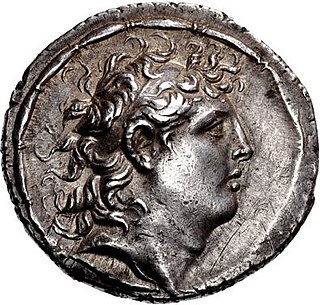
Diodotus Tryphon, nicknamed "The Magnificent" was a Greek king of the Seleucid Empire. Initially an official under King Alexander I Balas, he led a revolt against Alexander's successor Demetrius II Nicator in 144 BC. He rapidly gained control of most of Syria and the Levant. At first, he acted as regent and tutor for Alexander's infant son Antiochus VI Dionysus, but after the death of his charge in 142/141 BC, Diodotus declared himself king. He took the royal name Tryphon Autocrator and distanced himself from the Seleucid dynasty. For a period between 139 and 138, he was the sole ruler of the Seleucid empire. However, in 138 BC Demetrius II's brother Antiochus VII Sidetes invaded Syria and brought his rule to an end.
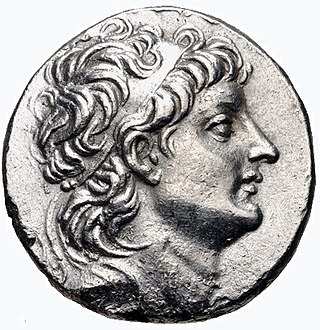
Alexander II Theos Epiphanes Nikephoros was a Hellenistic Seleucid monarch who reigned as the King of Syria between 128 BC and 123 BC. His true parentage is debated; depending on which ancient historian, he either claimed to be a son of Alexander I or an adopted son of Antiochus VII. Most ancient historians and the modern academic consensus maintain that Alexander II's claim to be a Seleucid was false. His surname "Zabinas" (Ζαβίνας) is a Semitic name that is usually translated as "the bought one". It is possible, however, that Alexander II was a natural son of Alexander I, as the surname can also mean "bought from the god". The iconography of Alexander II's coinage indicates he based his claims to the throne on his descent from Antiochus IV, the father of Alexander I.

Philip I Epiphanes Philadelphus was a Hellenistic Seleucid monarch who reigned as the king of Syria from 94 to either 83 or 75 BC. The son of Antiochus VIII and his wife Tryphaena, he spent his early life in a period of civil war between his father and his uncle Antiochus IX. The conflict ended with the assassination of Antiochus VIII; Antiochus IX took power in the Syrian capital Antioch, but soon fell in battle with Antiochus VIII's eldest son Seleucus VI.

Antiochus XI Epiphanes Philadelphus was a Seleucid monarch who reigned as King of Syria between 94 and 93 BC, during the Hellenistic period. He was the son of Antiochus VIII and his wife Tryphaena. Antiochus XI's early life was a time of constant civil war between his father and his uncle Antiochus IX. The conflict ended with the assassination of Antiochus VIII, followed by the establishment of Antiochus IX in Antioch, the capital of Syria. Antiochus VIII's eldest son Seleucus VI, in control of western Cilicia, marched against his uncle and had him killed, taking Antioch for himself, only to be expelled from it and driven to his death in 94 BC by Antiochus IX's son Antiochus X.

Seleucus VI Epiphanes Nicator was a Hellenistic Seleucid monarch who ruled Syria between 96 and 94 BC. He was the son of Antiochus VIII and his Ptolemaic Egyptian wife Tryphaena. Seleucus VI lived during a period of civil war between his father and his uncle Antiochus IX, which ended in 96 BC when Antiochus VIII was assassinated. Antiochus IX then occupied the capital Antioch while Seleucus VI established his power-base in western Cilicia and himself prepared for war. In 95 BC, Antiochus IX marched against his nephew, but lost the battle and was killed. Seleucus VI became the master of the capital but had to share Syria with his brother Demetrius III, based in Damascus, and his cousin, Antiochus IX's son Antiochus X.
Laodice I was a Greek noblewoman of Anatolia who was a close relative of the early Seleucid dynasty and was the first wife of the Seleucid Greek King Antiochus II Theos.

Mithridates I, also known as Mithridates I the Great, was king of the Parthian Empire from 165 BC to 132 BC. During his reign, Parthia was transformed from a small kingdom into a major political power in the Ancient East as a result of his conquests. He first conquered Aria, Margiana and western Bactria from the Greco-Bactrians sometime in 163–155 BC, and then waged war with the Seleucid Empire, conquering Media and Atropatene in 148/7 BC. In 141 BC, he conquered Babylonia and held an official investiture ceremony in Seleucia. The kingdoms of Elymais and Characene shortly afterwards became Parthian vassals. In c. 140 BC, while Mithridates was fighting the nomadic Saka in the east, the Seleucid king Demetrius II Nicator attempted to regain the lost territories; initially successful, he was defeated and captured in 138 BC, and shortly afterwards sent to one of Mithridates I's palaces in Hyrcania. Mithridates I then punished Elymais for aiding Demetrius, and made Persis a Parthian vassal.

King of Kings was a ruling title employed primarily by monarchs based in the Middle East and the Indian subcontinent. Commonly associated with Iran, especially the Achaemenid and Sasanian Empires, the title was originally introduced during the Middle Assyrian Empire by king Tukulti-Ninurta I and was subsequently used in a number of different kingdoms and empires, including the aforementioned Persia, various Hellenic kingdoms, India, Armenia, Georgia, and Ethiopia.

Cleopatra Selene was the Queen consort of Egypt from 115 to 102 BC, the Queen consort of Syria from 102 to 92 BC, and the monarch of Syria from 82 to 69 BC. The daughter of Ptolemy VIII Physcon and Cleopatra III of Egypt, Cleopatra Selene was favoured by her mother and became a pawn in Cleopatra III's political manoeuvres. In 115 BC, Cleopatra III forced her son Ptolemy IX to divorce his sister-wife Cleopatra IV, and chose Cleopatra Selene as the new queen consort of Egypt. Tension between the king and his mother grew and ended with his expulsion from Egypt, leaving Cleopatra Selene behind; she probably then married the new king, her other brother Ptolemy X.
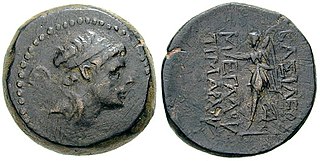
Timarchus or Timarch was a Greek noble and a satrap of the Seleucid Empire during the reign of his ally King Antiochus IV Epiphanes. After Antiochus IV's death, he styled himself an independent ruler in his domain in the Persian east of the Empire from around 163–160 BC, and may have even sought to entirely usurp leadership of the entire empire. He gained an alliance with the Roman Republic, which sought to weaken the Seleucid Empire by promoting internal divisions; both Rome and Timarchus distrusted the new king Demetrius I. Demetrius rode east and defeated Timarchus in 160 BC, ending his short reign.

Frataraka is an ancient Persian title, interpreted variously as “leader, governor, forerunner”. It is an epithet or title of a series of rulers in Persis from 3rd to mid 2nd century BC, or alternatively between 295 and 220 BC, at the time of the Seleucid Empire, prior to the Parthian conquest of West Asia and Iran. Studies of frataraka coins are important to historians of this period.

Wahbarz, known in Greek sources as Oborzos, was a dynast (frataraka) of Persis in the 1st half of the 2nd century BC, ruling from possibly c. 205 to 164 BC. His reign was marked by his efforts to establish Persis as a kingdom independent from Seleucid authority. He was able to reign independently for three decades, and even expanded to the west, seizing the Seleucid province of Characene. In 164 BC, the Seleucids repelled Wahbarz's forces from Characene, forcing him to re-submit as a Seleucid vassal. He was succeeded by Baydad.
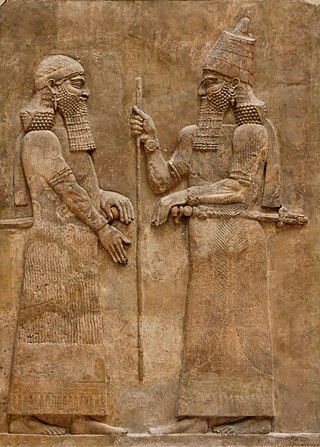
King of the Universe, also interpreted as King of Everything, King of the Totality, King of All or King of the World, was a title of great prestige claiming domination of the universe used by powerful monarchs in ancient Mesopotamia. The title is sometimes applied to God in the Abrahamic tradition.

















